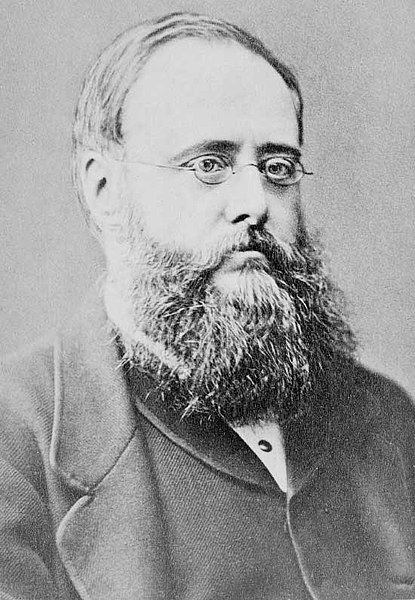
Wilkie Collins's Blind Love is a luxurious pleasure after hard work. It doesn’t take itself too seriously--it absorbs one's whole attention--and somehow it is believable while one reads. The intriguing characters include a harum-scarum young lord who romantically becomes a double agent in an assassins' group; Iris, a brilliant, faithful woman who saves him three times (once in men’s clothes); Hugh Mountjoy, a steady friend who fiercely loves Iris and negotiates her safety several times by bribing a confidence man to stay away; a con-man doctor; a former actress; and a half-mad maid.
Serialized in the Illustrated London News in 1889, Blind Love was completed by Walter Besant and posthumously published. , Collins on his deathbed left Besant copious notes on the development of the plot and even lines of dialouge. This neglected novel is worth looking up--but only do so after reading No Name, Armadale, The Moonstone, or some of his more famous works. The Dover paperback gives no background on Besant, just his short preface explaining the circumstances.
Now, back to Viragos. For every essay celebrating Virago’s 30th anniversary (the latest on Sunday June 4 by Justine Picardie), I have read at least five Viragos. Actually I read 8 last month. I can wholeheartedly recommend many: the witty Molly Keane (whose early books are published under the name M. J. Farrell), Nina Bawden’s Circles of Deceit (I’m a sucker for books about artists), Vera Brittain’s earnest Honourable Estate (which concentrates on the suffrage movement and socialism before and after WWI), and anything by Rose Macaulay (best known for Towers of Trepizand, but The World My Wildnerness and Told by an Idiod are also good and published by Virago).
I've most recently read Eliot Bliss's Saraband. What’s wrong with it? Why didn’t I like it? My enjoyment of this novel has been tepid at best. Saraband is the sometimes-poetic story of a dreamy Catholic girl, Louie, whose years at a Catholic boarding school never seem quite real to her (though she has one mischievous friend and mourns the pretty music teacher who leaves the nunnery ). Her idyllic home with her grandmother, Lulu, her mother, and uncles grounds her with an imagination that inspires some of the most vivid imagery and memories.
The first paragraph illustrates Louie's dreaminess: “All along the road from the river the frost made patterns on the ground, and how beautifully the air smelt...The sharp air hung over one’s head like the blade of a knife, she imagined it saying, ‘Behold, you shall be cold, you shall be cold...’ Winter had a most exciting smell, it made one think of people whom one knew and yet had never met, places where at some time or other one felt sure one must have lived and yet could not remember. The frost hung on the trees, it made them look as if they had gone white during the night from fear, it gave them a very queer stark look.”
Beautiful writing. this is great stuff, but why all the run-on sentences? As though she had turned stanzas of a poem into prose. Of course that's the point. Louie writes poetry and says she doesn't know how to write prose.
I also like this passage about leaving the business school where she learns stenography and typing.
“She was leaving the draughty, noisy place, the singing of the machines and the crowds on the stairs. Now they were all new people in the crowds, one hardly ever recognized a face anywhere. it was astonishing how quickly they changed. Very few people took the whole course. Most of them came to learn quickly, and they learnt quickly and went. And yet there were the same kind of people on the stairs. The same kind of conversation went on all around them....”
The pileup of adjectives and the unique phrase “singing” of the machines are brilliant. Then dreary short sentence follows short sentence. This particular Catholic feminist novel Isn’t in the same class as Antonia White’s Catholic novels. But Bliss does seem to be following in the footsteps of May Sinclair and Dorothy Richardson.
Dorothy Richardson, a friend of Bliss, may have influenced her style. Richardson, of course, is more innovative, but the more I write about Bliss the more I see this influence may be important.
3 comments:
But have you read "Luminous Isle"? I just got "Saraband" so I don't know, but I find her second novel very, very good. And she deserve credit for the overtly feminist aspect of it, no? I'm writing a paper on her, actually.
I'll have to look for it! She is an interesting writer, though Saraband didn't appeal to me much.
I really like Eliot Bliss. Her "Luminous Isle" has become important because of post-Colonial theory, but her "Saraband" is her more popular work. I love "Saraband" because it's like the novel I would write if I could write like her.
Post a Comment